Small business management: A step-by-step guide featuring 6 real businesses

Director of Content

Tags
Share
It’s not easy running a small business, especially when you consider the fact that things are always changing, from customer needs to new technology to marketing strategies.
So, how can you manage a new business—while keeping an eye on the future and making sure you can scale up smoothly when the time comes?
Likely, you have a full plate and have to wear multiple hats as you oversee a range of different areas in the business.
In this post, we’ll walk through how to get small business management right, using examples from real-life startups and small businesses that are thriving and getting ready to scale.
Unified Communications for Small Businesses
Talk, message, meet, and support customers—all in one beautiful workspace.
What is small business management?
Small business management involves aligning and co-ordinating all aspects of a small business. That can include managing employees, suppliers, finances and all the daily processes of the business. A small business manager will often also be responsible for overseeing the big-picture business plan.
Everyone’s definition of the company size of a “small business” is slightly different, but for our purposes, let’s just say these are companies with 1 to 99 employees.
Why is small business management important?
Well, there are a few reasons why good small business management is important, but here are the big ones.
It directly impacts employee productivity and performance
What a small business manager says or does will have a direct impact on employee performance—especially if this person is also the boss (and especially if you don’t have a human resources team yet).
Unlike a manager of a larger organization or business, a small business manager will likely have constant day-to-day contact with their employees.
So, their management style will be one of the most important factors in whether employees succeed or struggle. A manager can lift morale and inspire everyone to work together—or cause it to plummet.
It builds the foundation for company growth
A small business manager is often one of the first managers in a company (if not the first manager). And if this person is good at their job—and stays with the company as it grows—they will be a treasure trove of knowledge for new employees.
From the product development history to company dynamics and politics, to a holistic vision for the future, there’s a lot that this person will learn during their time as a manager, and they’ll be a key piece for the company’s growth plans.
Cash flow, cash flow, cash flow
Can’t run a business if you’ve got no cash. Do you want to maintain a healthy cash flow or be over budget every month? When it comes to management, your business finances are a huge part of the job.
Do you (or your manager) know how to hire strategically so you’re not overspending? What about choosing the right software and tools to fit your actual business needs (instead of trying to copy what Fortune 500 companies are doing with their tech stack)? These are all important parts of small business management.
(A manager who’s also the small business owner will probably have no trouble with this one.)
What are the most essential skills for running a small business?
Transparency and clear communication
Transparent and clear communication is a must, and this applies wherever you’re running your small business. This may not come naturally to many folks, especially because entrepreneurship can be a lonely journey in the beginning, but it’s essential as you’re building out a small business. All those great ideas can’t just live in your own head. You have to be able to communicate them to others who can help you turn them into reality.
Attention to detail
From performance-related metrics to business administration and revenue—and much more—there’s a lot of information to pay attention to in order to make good business decisions (often, in real time).
Incorporating a software as a service business model can be a game-changer for small businesses, offering scalable solutions that adapt to their evolving needs. And if there are tools that can help you measure and track this information, even better. (More on this below.)
Effective time-management skills
With so many tasks to juggle when running a small business, time management skills are a prerequisite of the job. You have to know how to manage, prioritize, and delegate, as well as stay on track when working with your team.
6 small business management tips from 6 small businesses
1. Build communication into your processes: TownCenter Partners
When people talk about business relationships, most will think of customers and prospects—but what about the business relationships with your own teammates?
Everyone knows and talks about how important communication is, and it can be even more challenging if you’ve got teammates in different countries and time zones?
Employees often get siloed, even when they’re in the same office, so how can you make sure that everyone’s communicating regularly?
The best thing you can do is to build communication into your day-to-day workflows. What that means: Have a good communications platform that lets everyone talk to each other through whatever channels you use as a company. Plus, using a work time tracking app can help monitor productivity and ensure efficient collaboration despite geographical distances.
Phone calls, video meetings, instant or SMS messaging—these are the most common channels that employees use to talk to each other (and often, clients and prospects as well), so your task is to make sure that they have the right tools that allow for that.
And realistically, you only really need one tool, because there are many unified communications solutions that have all of these in one app. For example, Dialpad’s desktop and mobile app lets you do all of those things, from the same place:

If your goal is to get to a work-from-anywhere kind of environment, this is essential because people will probably need to be able to work from either their computers or phone systems.
That’s exactly what TownCenter Partners, a boutique company, did. Because they’re a litigation finance company and regularly have to communicate with clients about sensitive matters, having a platform that helps them do that is essential. They ended up choosing a communications platform that lets them work 100% remotely—no physical phones needed.
👀 Thinking of getting a new phone system?
Check out Dialpad Connect. Not only does it come with video conferencing and team + SMS/MMS messaging, it's also a fully integrated contact center platform (if you need it)!
2. Look for creative ways to outperform larger competitors: CIVITAS
When you’re running your own business, especially if it’s a small business, it can be easy to get drawn into administrative day-to-day tasks and things like employee performance. While these are important, you have to keep an eye on the big picture.
Running a good business isn’t always enough. If you have ambitious plans and want to grow in the near future, you have to be aware of how you’re doing in comparison to other big players in your space.
You don’t have to copy exactly what they do, but at the very least, you should be aware of them, and know where your business is stronger in case this comes up in sales conversations.
That’s what CIVITAS, a commercial real estate brokerage and Dialpad customer, had to contend with. “As a real estate startup, we depend on technology and innovation to successfully compete with larger competitors,” says Carmen Perkins, their EVP.
If making sure your reps or agents can speak about competitors intelligently is important for you, Dialpad actually has a feature that’s specifically designed to help with that. They’re called Real-time Assist (RTA) cards, and you can customize a card with notes tailored to specific topics.
For example, you can create a card with strategic positioning notes about Competitor X—and set that to pop up automatically on your team’s screens when Competitor X’s name is spoken on a call. That’s the magic of Dialpad’s artificial intelligence:
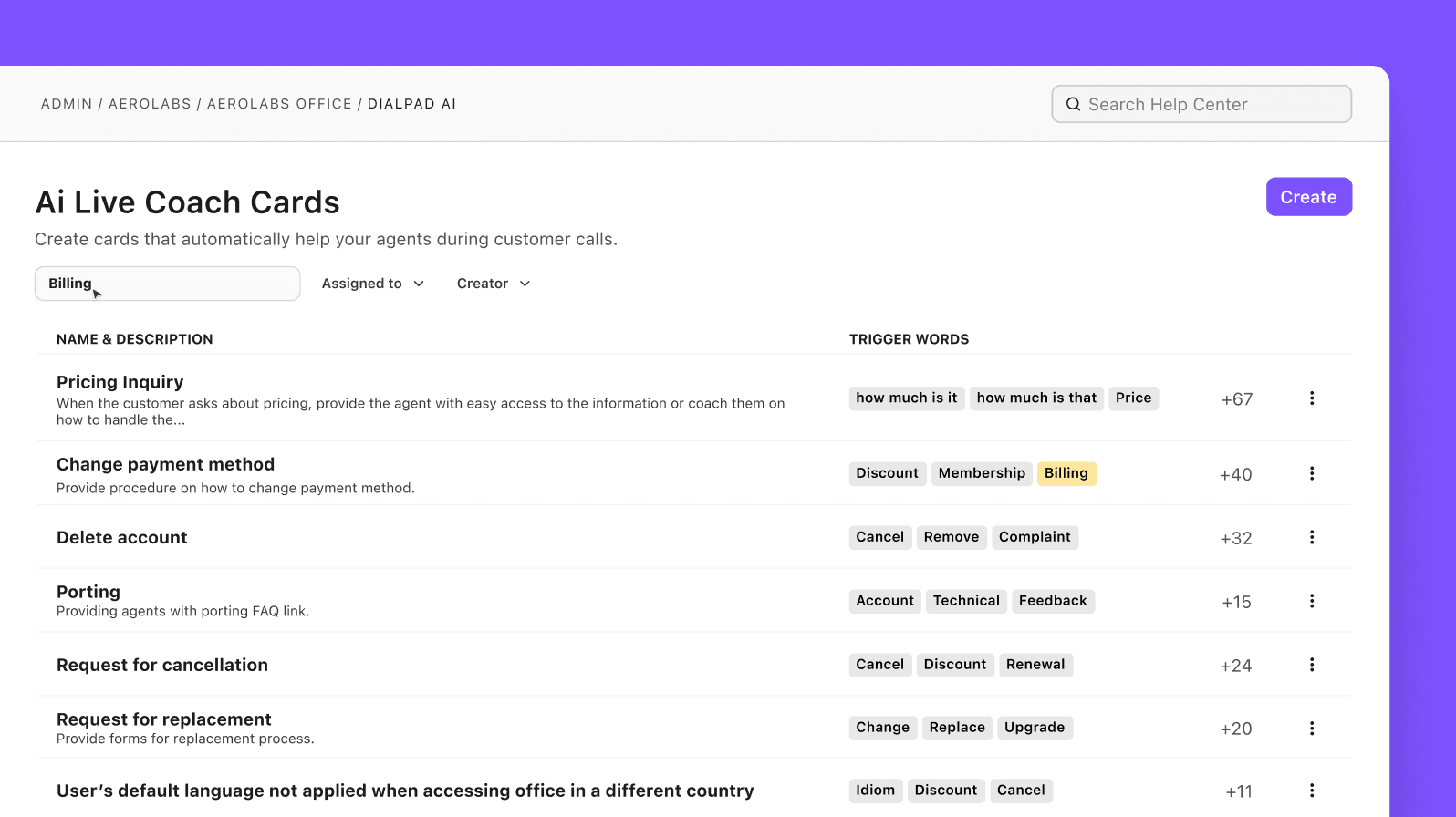
👉 Dialpad tip:
If you work at a startup and need a communications platform at an affordable price, check out the Dialpad for Startups program!
3. Have a strong hiring and onboarding plan: Katalyst
To grow a successful business, you need to have a solid hiring process. That includes not just choosing the right people to hire, but also things like the onboarding process and employee assessments.
They need to know the ins and outs of your business and all the tools you use, all while becoming competent at their roles quickly. So, how will you train them?
Katalyst, a fintech startup, hires new employees regularly as they grow their business, and one of the main teams that they’re hiring heavily for is their contact center team.
To do this, they chose an easy-to-use contact center platform that allowed them to add new agents and users, and manage everyone’s accounts from their online account:
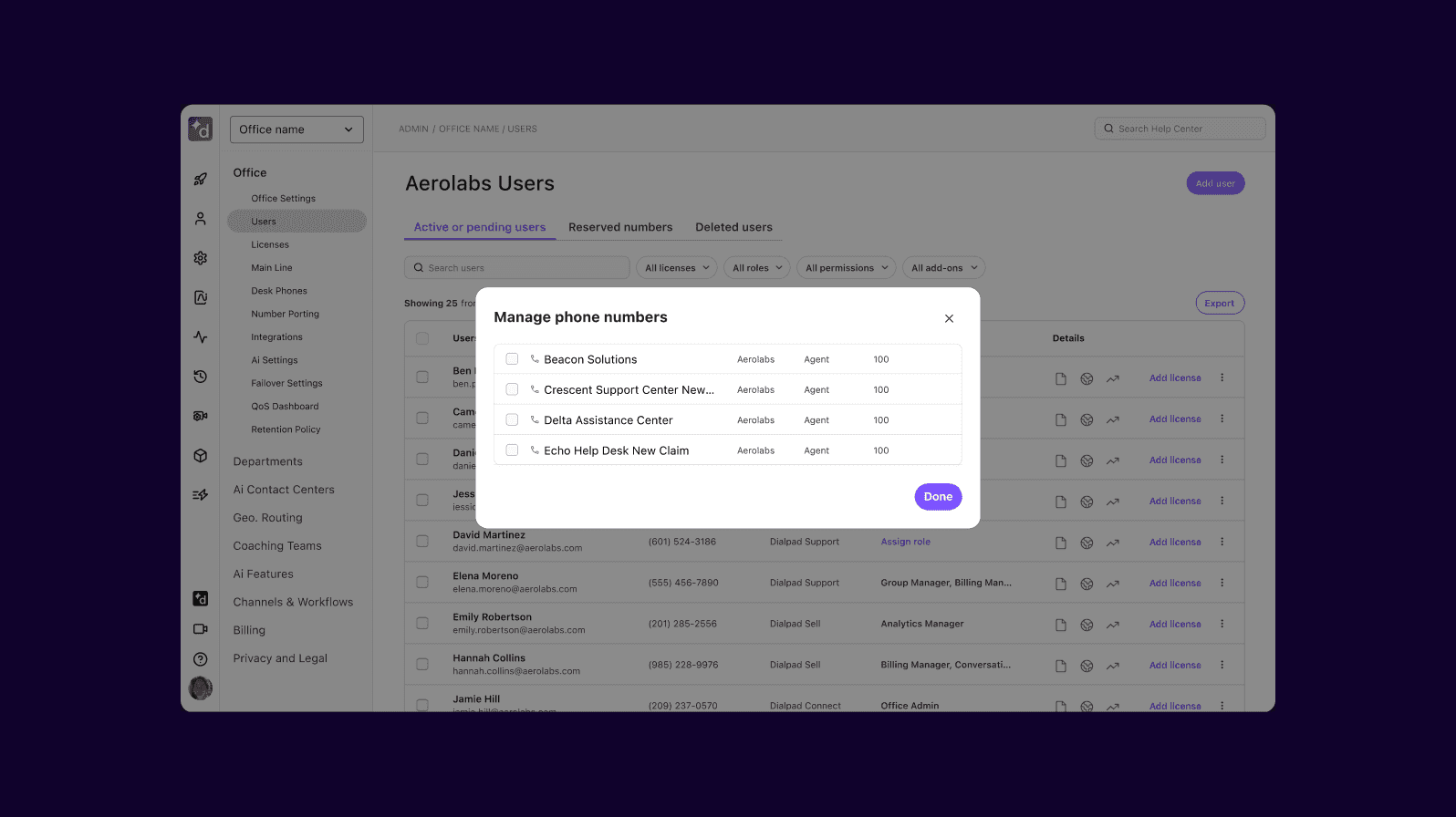
“Dialpad allows us to continuously add on lines, call centers, and departments as we grow internally, says Dan Roland, their CEO. “This allows us to be extremely agile in a cost-effective way.”
The entire company ended up getting set up with Dialpad in about 20 minutes, and agents could be on the phone chatting to customers and prospects right away. They could manage phone numbers, and pretty much do everything they need to set up new employees on their communications platform.
4. Use scalable tools: CureMint
When you’re setting up a new business, it’s still pretty easy to keep tabs on the cash coming in and out. But as your business scales and your business finances increases, that task can get a lot harder.
That’s why it’s important to choose scalable tools as you’re building out your tech stack. This is a big reason why SaaS products have become so popular—businesses can pay for the pricing plan that fits them, and then upgrade later to a more expensive plan when they actually need those advanced features.
(It can also help with bookkeeping and budgeting, if you can avoid those heavy upfront costs and instead pay a more affordable monthly or annual fee.)
That’s what CureMint, a software company that designed a procurement platform for dental organizations did. They have to stay connected to over 700 dental clinics, and as a small business, growing your team while communicating with so many different parties can be hard if you don’t have the right tools.
So, they went with a scalable communications tool that not only let them make phone calls, but could also do things like transcribe calls in real time and integrate with their Salesforce account to automatically log activities and let them make calls from right inside Salesforce:

“It’s a very agile software, not just a ‘one-size-fits all’ solution, and has a variety of abilities to suit different sized businesses,” says Brad Springer, their VP of Success, “Along with the ability to adjust as you grow and your needs change.”
5. Automate what you can and create repeatable processes and workflows: BuilderPrime
Being able to put manual tasks on autopilot can be a big help for small business management, mainly because you’re so pressed for time and have so many things going on.
Anywhere you can streamline your business operations, you should go for it. (Plus automation can help reduce the risk of human error.)
There are a whole range of things you can automate, from basic email templates to the steps in your sales workflow.
Builder Prime is a startup that prides itself on customer service, and one automation that has helped it greatly is actually a simple one that many people forget about when they think of automations: an IVR (or interactive voice response) system.
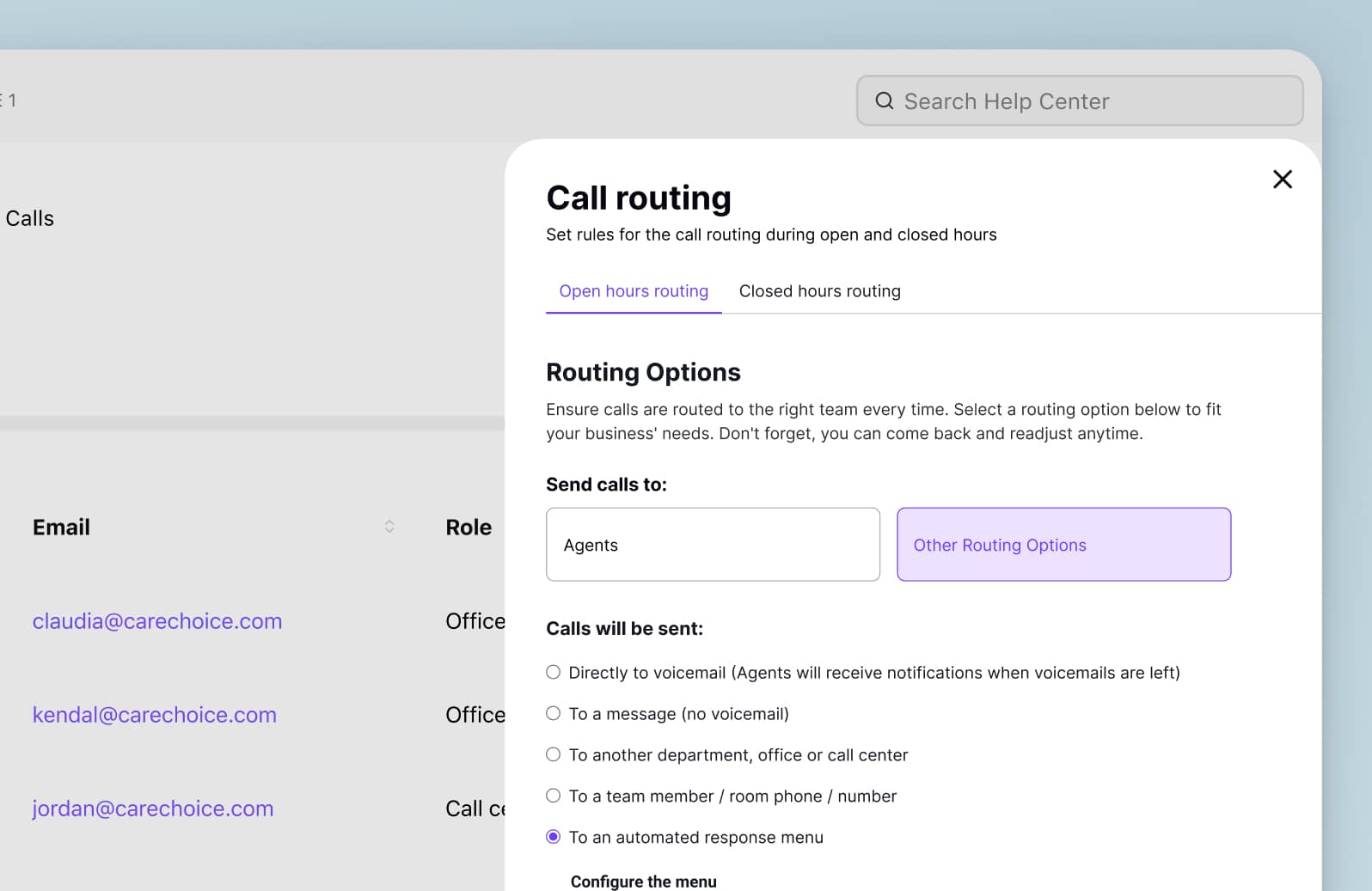
They chose a platform that lets them easily customize call routing options and that integrates with other software they use, like their inbox management tool, and they’re saving money too.
“It helps our team be more productive day-to-day and provide the best possible service to our customers,” says Jonathan Weinberg, their Founder. “We can answer more calls and provide quicker help for our customers because of the call routing and collaboration features.”
6. Don’t forget about compliance and security: Rocket Matter
Many small businesses are tempted to put off things like data regulations and security because they’re still so small that it’s unlikely that there’d be any stringent rules to adhere to this early on.
But that’s one thing to always keep an eye on, even if it’s not a top priority right now. One day, once you’ve grown to a certain point, that will be an important consideration, and you don’t want to be caught off guard.
(And if you have aspirations of becoming an international business, this one is especially relevant.)
But what does compliance look like? Well, if you collect customer information, record phone calls (even if it’s for QA purposes), and so on, that affects how you gather and manage all that data.
A great example of how to do this right is Rocket Matter, a legal practice management software. Being in the legal space, which is highly regulated, they know how important compliance and security are. They do track phone calls and call dispositions, and keep track of reporting regularly with Dialpad's contact center analytics:
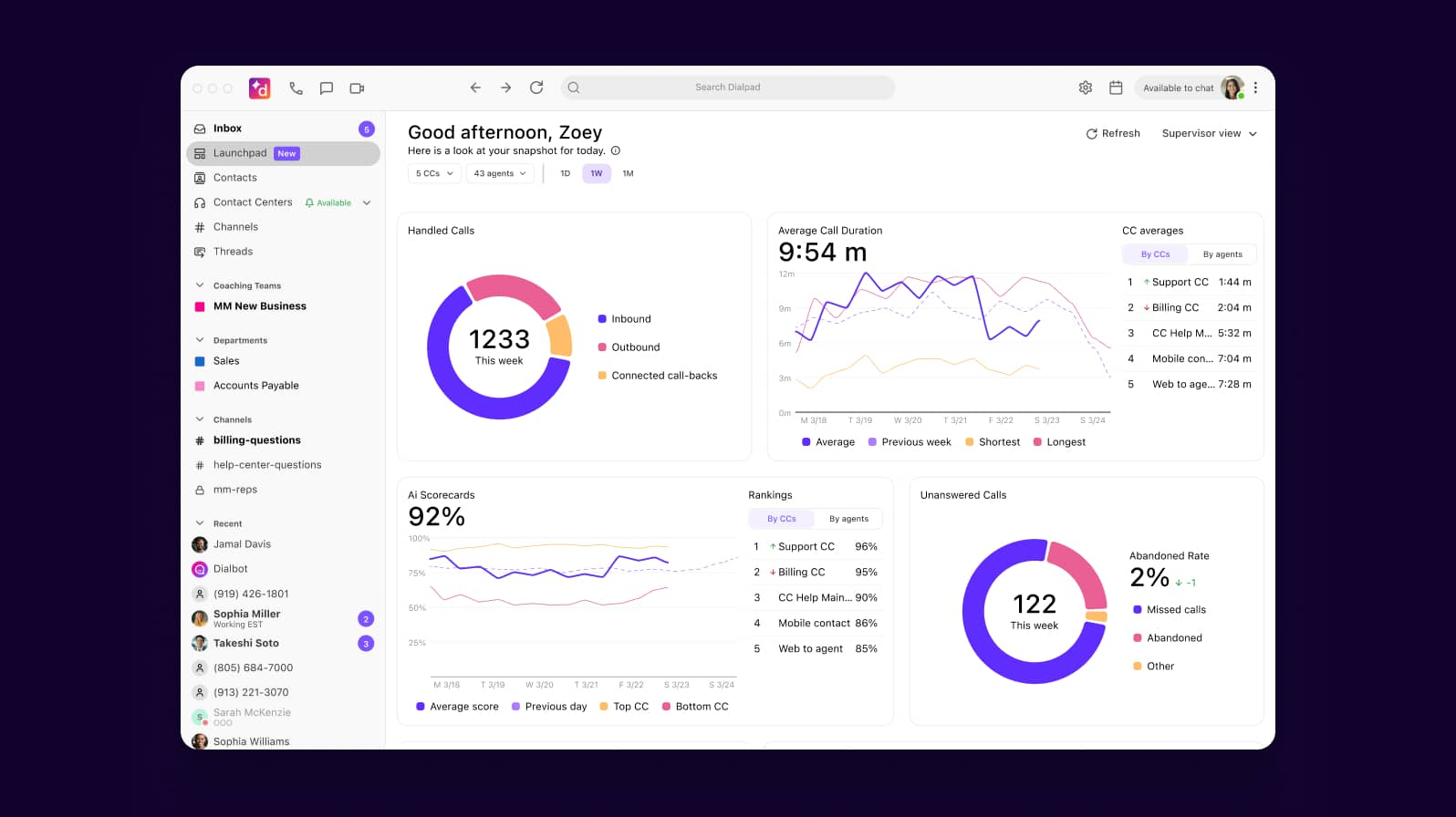
“Dialpad is secure and compliant which is a must, but it’s also so easy to use,” says Jeff White, Rocket Matter’s CRO. “This allows us to offer our attorneys the ability to easily, securely, and effectively reach us no matter where we are.”
5 essential tools for managing a small business
Choosing the right tools for a small business can help you run your day-to-day operations more efficiently, give your employees more flexibility, and yes, even cut costs.
But wait, how can spending money on software help save money? We’ll show you in just a bit.
A communication platform
From real-time communications like phone calls and video meetings, to asynchronous channels like instant or SMS messaging, your employees are likely using a variety of different ways to talk to each other.
One of the biggest mistakes that small businesses make is using one tool for video conferencing, another for messaging, and so on—when they could easily use just one tool that can handle all of those channels. (One great example of how choosing to spend your money on the right software can help you save money in the long run.)
For example, as we mentioned briefly earlier, a unified communications solution (like Dialpad) would let you do exactly that. You can make phone calls, have video meetings, and send messages all from the same app:

But there are two more things about Dialpad that are unique. One is that it also has a contact center platform that’s fully integrated into this communications app—meaning agents and supervisors can handle customer calls and manage a customer support or sales call center team all in one place:
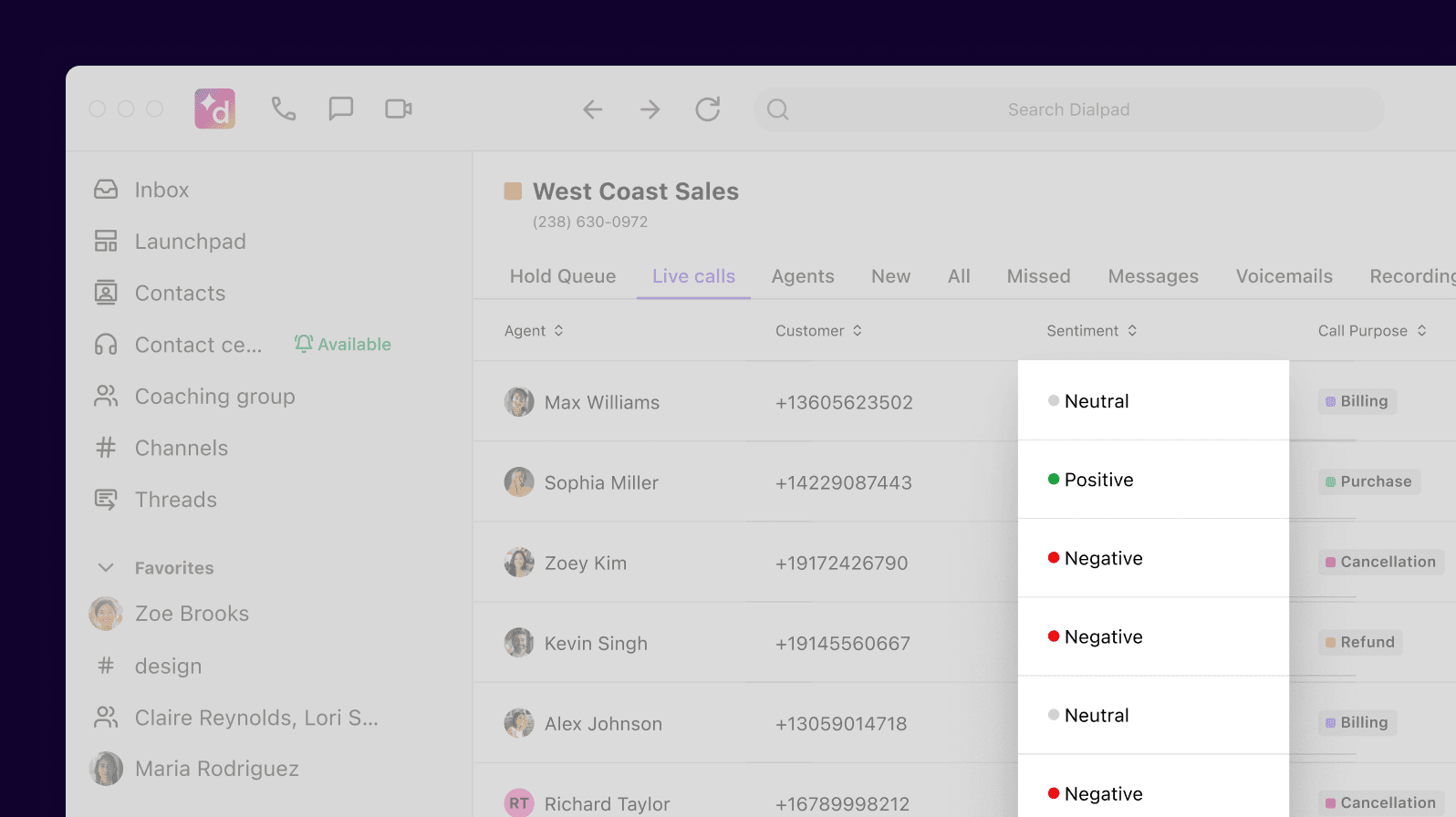
The other is that Dialpad has a built-in, proprietary artificial intelligence called Dialpad Ai that not only transcribes calls hyper-accurately in real time, but can also track how frequently certain keywords or phrases are spoken on calls. (Learn more about AI for small business.)
For example, if you wanted to see how often customers are calling about refunds, you could create a “Custom Moment” in Dialpad to track how often phrases like “money back” or “refund” are said on calls:

A CRM platform
A CRM or “customer relationship management” platform is a must for anyone running a business. If you have customers and prospects, you need a CRM.
Logging customer interactions and keeping meticulous records of their purchase history and preferences is a great habit to build up as a small business. (It’s almost much easier to build this muscle when you’re small, as opposed to when you’re a huge company and need to get everyone on the same page.)
With a CRM, your business can quickly pull up customer information when you’re on a call and they have a question, and you can also easily see where your prospects are in their buying journey. Some of the most popular CRMs that you’ve probably heard of are Salesforce, HubSpot, and Zoho CRM—and the good news is they all have quite a few integrations with other tools that can make your life easier.
For example, as we mentioned above, Salesforce integrates with Dialpad to allow agents to make calls from insight Salesforce without toggling back and forth between different windows—and Dialpad’s RTA cards also work inside Salesforce.
That means if a sales rep is talking to a customer from their Salesforce window, those real-time hints will pop up on their screen inside Salesforce—they don’t have to be in Dialpad to see the RTA card:

Not only that, Salesforce’s integration with Dialpad is also fully functional on the mobile app—this is pretty rare because most of the other Salesforce + phone system / communications platform integrations only work on desktop.
Project management software
Project management tools, such as Trello and Asana, can be very useful when it comes to small business administration and keeping track of your to-do list and other tasks. What’s neat about kanban-style tools like these is that they also let you see, holistically, how all your projects are progressing.
These are especially popular with marketing teams, but really, any team that has to keep track of multiple ongoing projects at the same time, that all have many moving parts, would find project management software helpful.
A file sharing tool
Having the ability to share files at a moment’s notice is vital, particularly when you’re talking about contracts, proposals, and other documents. Today, most companies don’t print everything off any longer—instead, they use file sharing platforms to securely share and store these documents.
Here are a few things to look for in a cloud-based file management software:
The ability to share files in a wide variety of formats (depending on what you need), like text documents, product packaging designs, images, and videos, along with shared access to generous storage space
A large amount of cloud storage space, if you plan on storing lots of documents (Dialpad, for example, lets you store call recordings right in the platform—again, no need to spend money on a separate tool)
Integrations with tools you already use
A social media management tool
This isn’t a must-have, but if you’re an ecommerce company or a B2C company that needs to be on social media, it can be very useful, especially if your business has different accounts on different channels.
If you have a presence on Facebook, Twitter, Pinterest, and Instagram, for example, managing all those separately can be a huge time suck, especially if you’re a startup.
Tools like Buffer and Sprout Social are among the popular social media management tools that can help you centralize all your posts and direct messages across these platforms in one place.
Invoice management software
Efficient invoice management software is crucial for small businesses, as it streamlines the billing process, reduces errors, and ensures timely payments. By automating invoicing, companies can save time, improve and maintain healthy cash flow, and focus on their core activities.
Billdu invoicing software is an excellent choice for businesses looking to streamline their document management. This smart tool allows users to generate invoices, quotes, purchase orders, and delivery notes, as well as send and track them from any location, making it ideal for busy professionals.
Pro tip: Control your cash flow with the best financial tools to ensure timely payments and maintain a healthy business balance.
An email automation platform
Social media algorithms change frequently, and paid ads are becoming more costly. To maximize reach and effectiveness, SMBs should diversify their marketing strategies. One of the most reliable and high-ROI channels is email marketing.
Email automation platforms enable SMBs to consistently engage with their audience, nurture relationships, and convert leads into sales.
These tools automate the process of sending targeted emails based on customer behavior and preferences, ensuring personalized communication. Think welcome emails, abandoned cart reminders, or review requests – all of these campaigns can be automated with the right tool.
Platforms like Mailchimp and GetResponse offer robust features for running effective campaigns without straining your budget, making them ideal for SMBs aiming to grow efficiently. Most of them also integrate directly with CRMs and other marketing tools we’ve mentioned in this article.
What’s the small business management strategy that fits your growth plan?
Whether you’re a solo entrepreneur or co-founder, whether you’re worried about hiring internationally or supply chain customer service issues, the task of running a small business can feel overwhelming at times.
With these case studies and tips, you should be able to start thinking about how to manage your business for the future in a flexible and scalable way.
And if you need a tool to help you with remote and hybrid communications, check out Dialpad!
Looking for a more efficient way of managing your small business' communications?
Sign up for a 14-day free trial to try Dialpad out! It takes just a few minutes to get started, and you'll be set up with a virtual business number too. Or, take a self-guided interactive product tour of the app first!
